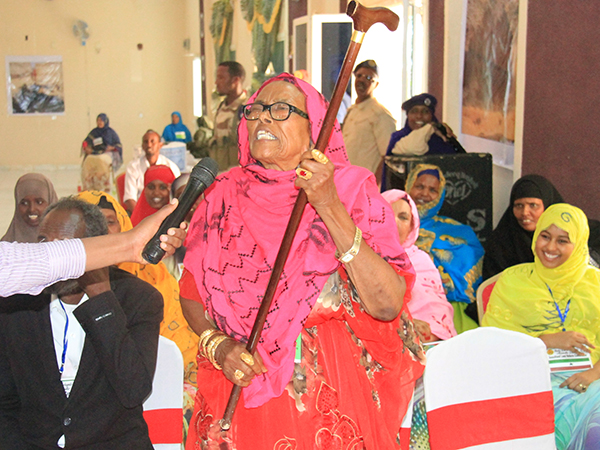Sustaining the ability to vote for peace in Somaliland

With the voter registration now underway in Somaliland and with technical support from Interpeace and facilitation from its partner the Academy for Peace and Development (APD) in place, we look back at the challenges encountered in the lead up to this landmark period.
Spring 2008 turned out to be a critical juncture for the democratisation and electoral process in Somaliland. The presidential mandate was due to expire on 15 May and the opposition parties and the National Electoral Commission (NEC) disputed the length of the extension provided by the traditional Council of Elders (the Guurti). This resulted in a stalemate and increasing tensions within the community. Political rallies were held in protest against the postponed elections on the 17th anniversary of the formation of Somaliland on 18 May 1991. In some areas the Somaliland army was put on alert, with reinforcements brought into Burao and Hargeisa. Tensions were running high, aggravated by the use of the media by political actors to convey messages to their political opponents and the public.
The Academy for Peace and Development (APD) team, its board of directors, and “Friends of the Academy” were all active in mobilising on every front to preserve Somaliland’s stability through the political crisis, with the community leaders throughout Somaliland showing a clear consensual commitment to peaceful resolution.
Recognising the potential for the situation to deteriorate into violent conflict, different stakeholders rallied to support peaceful resolution of the political crisis and preserve the stability of Somaliland:
- Civic networks, youth groups and local NGOs mobilised local communities, hung white banners calling for peace, and appealed to the president to show leadership.
- The business sector appointed a committee to lobby for peaceful resolution.
- Somali National Movement (SNM) veterans passed messages to the political leaders and president that law and order and peace must be sustained and that this was a higher priority than “who wins”.
- Somalilanders in the diaspora made frequent phone calls to members of the political par-ties as well influential figures and opinion-makers urging them to sustain peace and law and order.
The various pressure groups also lobbied the Somaliland media to stop hostile reporting that could further increase the crisis. As a result, the media managers recognised that the way in which television broadcasts, in particular, and newspaper reporting was being conducted was part of the problem and agreed to monitor their broadcasts carefully. As a result of concerted efforts from different sides, agreement was also reached by the political parties to refrain from using the media for propaganda in order to foster a peaceful resolution of the political crisis.
In March, the National Electoral Commission and APD had held a series of discussions resulting in agreement on and signing of a MoU between them. This enhanced the ability of APD to assist in providing a neutral political space for furthering the democratisation process by giving APD the mandate, with the full encouragement and support of the NEC, to begin the process of engaging all three political parties in the establishment of a consensus timeline for voter registration and elections.
The APD team and Interpeace office in Nairobi, Kenya, in close collaboration with the Democratisation programme donor steering committee, engaged in intense discussions with different stakeholders to resolve the impasse. Through mediation efforts, behind–the-scenes consultations, and bilateral discussions with the political parties, a strategy was developed to facilitate a realistic electoral timetable and ensure ownership by the key stakeholders. Although the NEC faced resistance from some quarters during this process, the support of APD and Interpeace facilitated progress, broadening the political space for resolution of the crisis.
The unified position of the donors was another essential factor in the successful resolution of the crisis. This included withdrawal of all funding for the elections (through Interpeace’s Democratisation programme) when the process was clearly off-track – and reinstating the funding when consensus was reached on the way forward.
Through the cooperation of the key stakeholders, a meeting was arranged between the leaders of the three political parties at the presidential palace on 1 June. After several hours of discussions, the three political parties delivered an eight point agreement:
- To postpone the local elections and hold the presidential elections first.
- To delay the local elections in order to provide sufficient time for effective voter registration.
- For NEC to prepare for the presidential election date after completion of the voter registration process.
- To hold the presidential election before 6 April 2009.
- To nullify the articles in the Voter Registration Act that hinder the voter registration modality.
- In case of delay, the three political parties and NEC shall determine any period of exten-sion and the Guurti shall respect and endorse that timeline.
- The three political parties and the government shall have regular dialogue and consultations.
- The technical committee shall be permanent and deal with confidence and trust-building among the three political parties.
The process successfully concluded with the three political parties signing an agreement on 9 June to resolve their differences on the electoral time table.
Subsequently the Voter Registration Act was amended in line with the agreement reached above.
A high level Joint Committee is due to be established to assist with for peaceful resolution of any forthcoming issues relating to voter registration or the elections.
APD’s involvement has been appreciated by all sides and has enhanced the status and releance of the APD team in the democratisation process. Although the Voter Registration, which began in October, had to be suspended after the bomb attacks in Hargeisa on 29 October, it is due to resume on 17 November and is generating immense public interest and support.
